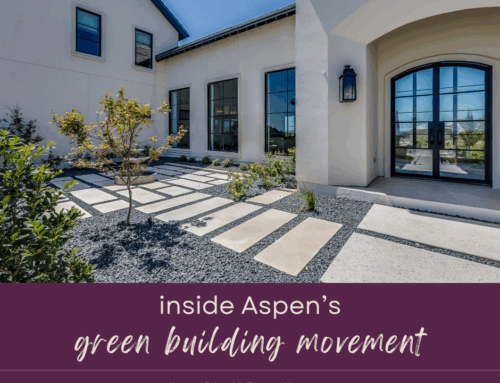Aspen is home to some of the most beautiful and exclusive luxury properties in the country. But building or expanding an estate here requires more than just a vision—it also means understanding strict local regulations. Zoning laws, land use restrictions, and environmental protections all play a role in what you can build, where, and how. If you’re considering constructing a custom home or making significant changes to an existing property, it’s essential to plan with these rules in mind.
Navigating Zoning and Building Regulations for Aspen Estates
Aspen’s development policies are designed to preserve natural beauty, manage growth, and ensure sustainability. This guide explains the following:
-
Understanding Aspen and Pitkin County zoning
-
Size and height limitations for luxury homes
-
Setbacks, site planning, and design review
-
Permitting process and timelines
-
Why working with local experts is essential
Here’s a closer look at each.
Understanding Aspen and Pitkin County Zoning
Zoning in Aspen is governed by both the City of Aspen and Pitkin County, depending on where the property is located. Zoning codes regulate land use, building size, density, and permitted activities. This means that before you can break ground—or even finalize a design—you need to confirm the zoning classification of your parcel.
Common zoning designations include:
-
R-15 and R-30: Low-density residential zones typical for large estates
-
RR: Rural residential, often found outside the city limits
-
PUD (Planned Unit Development): Customized zones for larger or more complex developments
Each zone has specific rules about how much you can build (floor area ratio or FAR), where structures can be located, and how they must relate to surrounding land.
Size and Height Limitations for Luxury Homes
Aspen’s zoning code places firm limits on the square footage, height, and mass of new construction. These limits vary by zone, but in general:
-
Maximum home size is regulated based on lot size and zone
-
Height is often capped between 25 and 35 feet
-
FAR (Floor Area Ratio) limits control how much enclosed space you can build relative to the size of your lot
Large homes may require additional approvals through the Growth Management Quota System (GMQS), which limits how much new residential square footage can be built each year in Pitkin County.
These restrictions help prevent overdevelopment and protect scenic views. If you’re looking to build a spacious estate, be prepared to work through added review processes or apply for special approvals.
Setbacks, Site Planning, and Design Review
Setbacks—the required distance between a structure and the property lines—are strictly enforced in Aspen. Setbacks vary depending on the zone but generally increase with the size of the lot. You must also consider:
-
Site grading: Regulations limit how much you can alter slopes or terrain
-
Tree preservation: Large or historic trees may need to be preserved or replaced
-
Snow storage: Driveways and outdoor spaces must accommodate on-site snow storage
-
Solar access: Homes must not block neighboring solar access in some areas
Most new builds or major renovations must go through the City of Aspen or Pitkin County’s Design Review process. This ensures that the architectural style, materials, and layout fit the natural surroundings and community context.
For official planning tools and guidance, visit pitkincounty.com, where you can access zoning maps, application forms, and land use codes.
Permitting Process and Timelines
Permitting in Aspen can be complex and time-consuming. You’ll typically need to submit site plans, architectural drawings, engineering reports, and zoning verification. Depending on the scope of your project, you may need multiple permits for:
-
Building and construction
-
Demolition
-
Environmental impact or stormwater control
-
Utility connection or septic systems
-
Historic preservation (for older properties)
Once submitted, reviews can take several months—especially for larger homes or custom estates. If your project requires GMQS approval or a variance, it can add additional time to your schedule.
Planning ahead and assembling a qualified design and construction team can help you navigate these steps more efficiently.
Why Working With Local Experts Is Essential
Because Aspen’s zoning and permitting regulations are so specific, working with a local REALTOR®, architect, and builder is critical. They’ll understand the nuances of land use codes and know how to:
-
Select a parcel with favorable zoning and fewer restrictions
-
Design a home that meets current codes and approval standards
-
Navigate design review and permitting requirements
-
Communicate with city and county officials effectively
A REALTOR® who knows Aspen’s luxury market can also help you evaluate whether buying an existing estate or building from scratch is the better path for your goals.
FAQ About Aspen Zoning and Building Rules
Check out these commonly asked questions about zoning and building regulations in Aspen. If you don’t see your question here, please call our office and we’ll find you the answers you need.
Can I Build Any Size Home I Want on My Land?
No. Home size is limited by zoning, lot size, and floor area ratios. Larger homes may also need GMQS approval, which can take extra time and review.
What Is the Growth Management Quota System?
GMQS is a policy that limits the amount of new residential square footage that can be built each year in Pitkin County to control growth and protect resources.
Do I Need Permits to Remodel an Existing Estate?
Yes. Most renovations—especially structural or exterior changes—require permits and may need design review. Cosmetic interior updates may not.
Can I Tear Down an Old Home and Start Over?
Possibly, but you must follow demolition permit requirements, and in some cases, preservation rules. Historic properties have stricter regulations.
How Long Does the Approval Process Take?
Timelines vary by project size and location, but full approval can take anywhere from 3 to 12 months or more. Early planning and a strong team help reduce delays.
Building or renovating in Aspen comes with unique challenges—but also exceptional rewards. By understanding zoning laws and development regulations from the start, you can avoid delays, protect your investment, and create a luxury home that’s as compliant as it is beautiful. A trusted REALTOR® with local expertise can help you find the right property and connect you with professionals who know how to bring your vision to life.
Get a FREE CMA on your home in 24hrs or less!
It's a SELLERS Market! Even if you are even just THINKING about selling, knowing what your home's TRUE market value is valuable information. Fill in your info below and we will send you a complete Market Value Report that shows you what it is REALLY worth in today's market.
Are You Selling or Buying a Home in Aspen?
If you’re ready to sell your home in Aspen, Woody Creek, Basalt, Carbondale or Snowmass, we may be able to help you.
Get in touch with us right now to find out how much your home is worth – and discover how we’ll be able to help you sell it quickly and for top dollar.
If you’re also looking for a home for sale in Aspen or a nearby community, check out our listings by price in the table below.
Aspen Homes for Sale by Price
| $200k to $300k | $300k to $400k | $400k to $500k |
| $500k to $600k | $600k to $700k | $700k to $800k |
| $800k to $900k | $900k to $1 million | Over $1 million |
Error 401: Access key is invalid or has been revoked, please ensure there are no spaces in your key.
If the problem persists, please reset your API key in the IDX Broker Dashboard, or contact help@idxbroker.com















